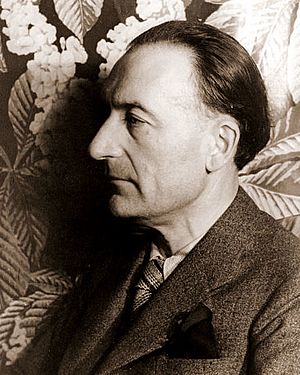Jules Romains facts for kids
Quick facts for kids
Jules Romains
|
|
|---|---|

Jules Romains, photo taken
by Carl Van Vechten, 1936 |
|
| Born | Louis Henri Jean Farigoule 26 August 1885 Saint-Julien-Chapteuil in the Haute-Loire |
| Died | 14 August 1972 (aged 86) Paris |
| Occupation | Poet and writer |
| Language | French |
| Education | lycée Condorcet École normale supérieure |
| Literary movement | Unanimism |
| Notable awards | elected to the Académie française |
| Signature | |
 |
|
| President of PEN International |
|
| In office October 1936 – October 1941 |
|
| Preceded by | H. G. Wells |
| Succeeded by | Wartime International Presidential Committee (1941–47) |
Jules Romains (born Louis Henri Jean Farigoule; 26 August 1885 – 14 August 1972) was a famous French poet and writer. He created a special writing style called Unanimism.
Some of his well-known works include the play Knock ou le Triomphe de la médecine and a long series of books called Les Hommes de bonne volonté (which means Men of Good Will). An American writer, Sinclair Lewis, once said that Jules Romains was one of the six best novelists in the world. He was also nominated for the Nobel prize in literature sixteen times.
Contents
Life and Education
Jules Romains was born in a place called Saint-Julien-Chapteuil in France. He later moved to Paris to study. He attended the Lycée Condorcet and then the very respected École Normale Supérieure.
He was part of a group called the Abbaye de Créteil. This group, started in 1906, included writers, painters, and musicians. They believed in creating a perfect community. In 1909, he earned a high degree in philosophy.
Working for Peace
Between World War I and World War II, Jules Romains spoke out for peace. He wanted European countries to work together. He was against the rise of fascism and dictatorships.
In 1927, he signed a petition. This petition was against a law that would limit people's freedom to speak and think during wartime. Many other writers and thinkers also signed it.
During World War II, he had to leave France. He first went to the United States. There, he spoke on the radio for Voice of America. Later, in 1941, he moved to Mexico. In Mexico, he helped start a French institute for Latin America.
Later Life and Recognition
Jules Romains wrote about many different topics. On 4 April 1946, he was chosen to be a member of the Académie française. This is a very important group that protects the French language. He held chair number 12 out of 40.
He also served as the President of PEN International. This is a worldwide group for writers. He led the organization from 1936 to 1941. In 1964, he was honored as a special citizen of Saint-Avertin. He passed away in Paris in 1972.
Criticism of His Work
A writer named Aimé Césaire criticized Jules Romains in an essay from the 1950s. Césaire pointed out some statements in Romains' novel Salsette Discovers America. These statements were seen as unfair or prejudiced towards certain groups of people.
Understanding Unanimism
Jules Romains is well-known for his idea of Unanimism. This idea is also shown in his long series of novels, Les Hommes de bonne volonté (The Men of Good Will). This series tells the story of two friends, a writer and a politician, over 25 years. Their journey shows what Unanimism means.
Originally, Unanimism meant being against focusing only on individuals. It was about feeling connected to all life and humanity. Later, Romains explained it as showing the world without judgment. He believed in strong togetherness while still protecting individual rights. His first book, La vie unanime, published in 1904, already had these ideas.
Major Works
- Men of Goodwill (Les Hommes de bonne volonté, 1932-1946; 27 volumes)
- The body's rapture (Psyche), 1933
- Salsette Discovers America, 1942
- Tussles with time (Violation de Frontières, 1951), 1952
- The Death of a Nobody (Mort de quelqu'un, 1911)
Film Adaptations
Many of Jules Romains' plays and novels have been made into movies.
Films Based on His Works
- Knock, directed by René Hervil (1925, based on the play Knock)
- Knock ou le triomphe de la médecine, directed by Roger Goupillières and Louis Jouvet (1933, based on the play Knock)
- Donogoo Tonka, directed by Reinhold Schünzel (1936, based on the play Donogoo)
- Donogoo, directed by Reinhold Schünzel and Henri Chomette (1936, based on the play Donogoo)
- Dr. Knock, directed by Guy Lefranc (1951, based on the play Knock)
- Les Copains, directed by Yves Robert (1965, based on the novel Les Copains)
- Knock, directed by Lorraine Lévy (2017, based on the play Knock)
Screenwriting Credits
- The Portrait (1923), directed by Jacques Feyder (1923)
- Volpone, directed by Maurice Tourneur (1941)
See also
 In Spanish: Jules Romains para niños
In Spanish: Jules Romains para niños
 | Georgia Louise Harris Brown |
 | Julian Abele |
 | Norma Merrick Sklarek |
 | William Sidney Pittman |

